

New Hampshire
Wildcats 1974
(Authentic Reproduction)
For those who have not been fortunate enough to enjoy the fall season in New England, the foliage is as beautiful and the fresh air as brisk and refreshing as literature and lore have described. Though there would perhaps be an argument among the New England states as to which is most beautiful or majestic, each can stake a claim with New Hampshire certainly in the forefront. Surprisingly to some, the level of athletics and education at the University Of New Hampshire is nationally recognized as excellent. Founded in 1866 as a land grant university to primarily serve the educational needs of the children of farmers and laborers within the state, the University Of New Hampshire has taken the lead in some specific areas of New England academia. With a NASA Space Science Center and alumnus Richard Linnehan, veterinarian and NASA astronaut who has logged four space flights, UNH has an area of specialty that few other universities can claim.
|
|
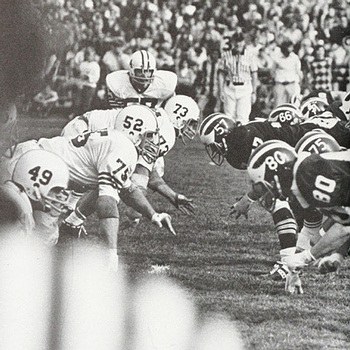 |
The football program was started in 1893 and the Wildcats nickname and mascot were adopted in 1926. A perennial power at the FCS level and prominent in the very strong Colonial Athletic Conference, the UNH teams truly came of age under the tutelage of Bill Bowes. Only twenty-eight years of age when he took over as the UNH head coach in1972, he eventually became a state treasure, school icon, and “curator” of a coaching tree that includes Chip Kelly, Mark Whipple, and current UNH head coach Sean McDonnell.
It did not take Bowes long to make his mark. On September 29, 1973 the Wildcats recorded their first win over Dartmouth in seventy-two years by a 10-9 score and they have dominated the series since. Many of the top “College Division” teams played in the Yankee Conference and have continued to this day as members of the Colonial Athletic Conference. Yet under Bowes, UNH was almost always a contender.
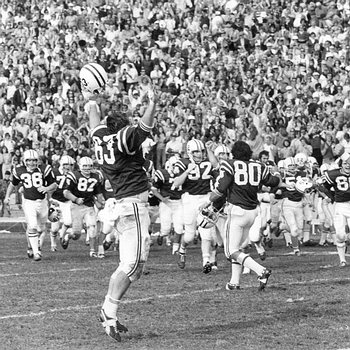 |
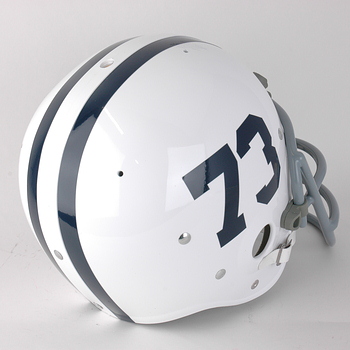 |
Bowes was a tough, heady player at Pennsylvania’s Lock Haven High School before serving as a three year letter winner and team captain at Penn State in 1964, manning his post as a dependable defensive back. He won PSU’s prestigious Student-Athlete Award for ’64 and played in the Blue-Gray Game. As an offensive line coach at New Hampshire and Boston College, he produced the same types of players as he had been. As the new head coach at UNH, he demanded full effort and got it.
His early teams set the tone for what became a head coaching career that stretched through the 1998 season, producing four conference titles and two divisional championships. His 175-106-5 record made him one of the most respected coaches of his day and his first three teams were the foundation for a very quick fix as the ‘75 and 1976 teams won the Yankee Conference crown. His identical record 4-5 squads of 1972 and ’73 learned his system and his expectations. They played hard, aggressive football, with the ’72 team led by Co-captains linebacker Ed Booker and guard Gary Moran, both All Conference choices with offensive lineman Don Miller. With nine of eleven defensive starters returning for 1973, Bowes relied upon Co-captain and linebacker Rich Langlois and linemen Mike Lanza and Russ Walters among others on this unit. Scoring only ten touchdowns for the year and yielding twenty-four interceptions, the offense did not play up to the spirited lead of the defense, though guard Dave Giguere, the other Co-captain, like Langlois, was an All Yankee Conference pick. Overcoming a tough start in ’74, Bowes’ Wildcats won four of their final five games, finished 5-4 and laid the groundwork for the championships to come.
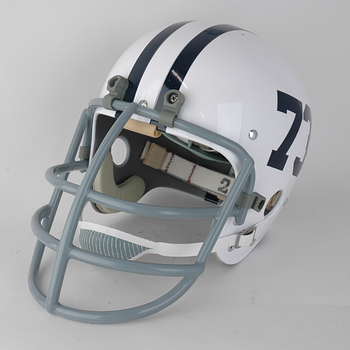 |
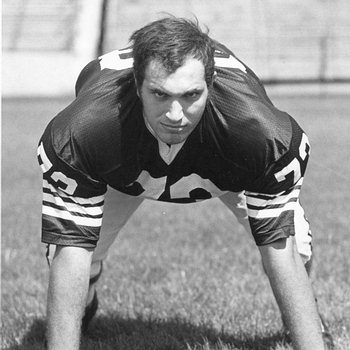 |
One of the key starters on the ’74 squad, led by All Conference honorees Mike Lanza and tight end Mike Maroney, was defensive lineman Russ Walters.
Expected to contribute as a sophomore and then be a leader and starter afterwards, Walters fulfilled the staff’s expectations. As a 6’2”, 250 pounder from Lodi, New Jersey, he was strong, quick, and tenacious. Not a star but certainly one of those that formed the backbone of the UNH defense, Walters was consistently good.
He completed his career at UNH recognized as an excellent football player and outstanding student. Giving the same effort to his studies, Mr. Walters earned a Bachelors Degree in Business Administration and matriculated to graduate studies in his native New Jersey. At Rutgers University, he obtained a Masters Degree in Management and in the following years, was very successful as an executive with one of the nation’s largest global specialty chemical and plastics companies. More typical than the super stars that fill the sports sections’ pages and often post-football career, littler the front pages of the newspapers with tales of financial and personal woe, Mr. Walters utilized his athletic talent, penchant for hard work and effort, and parlayed those into a successful collegiate football career and an underrated but excellent academic environment, and a rewarding vocational career after his college days.
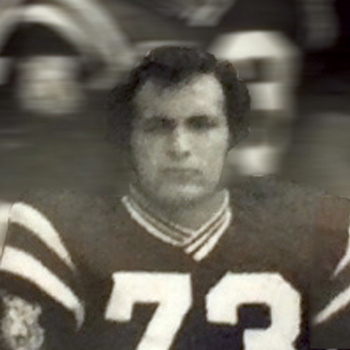 |
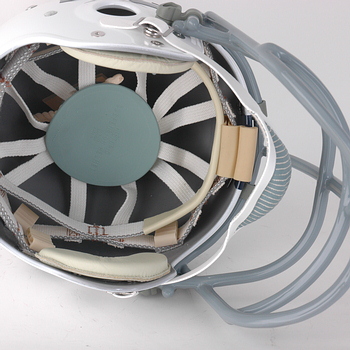 |
Walters and his teammates wore uniforms that were typical of the day, void of garish and often distracting trim although the UNH jerseys did feature a beautifully embroidered Wildcat head on each sleeve.
The
helmet was an expression of the straight forward ruggedness that Coach
Bowes expected of his players and team. The white shell was adorned with
Navy blue flanking stripes and player identification numerals on each
side. The look was simple, to the point, and in its simplicity,
appreciated by the UNH fans that have continued to be supportive.